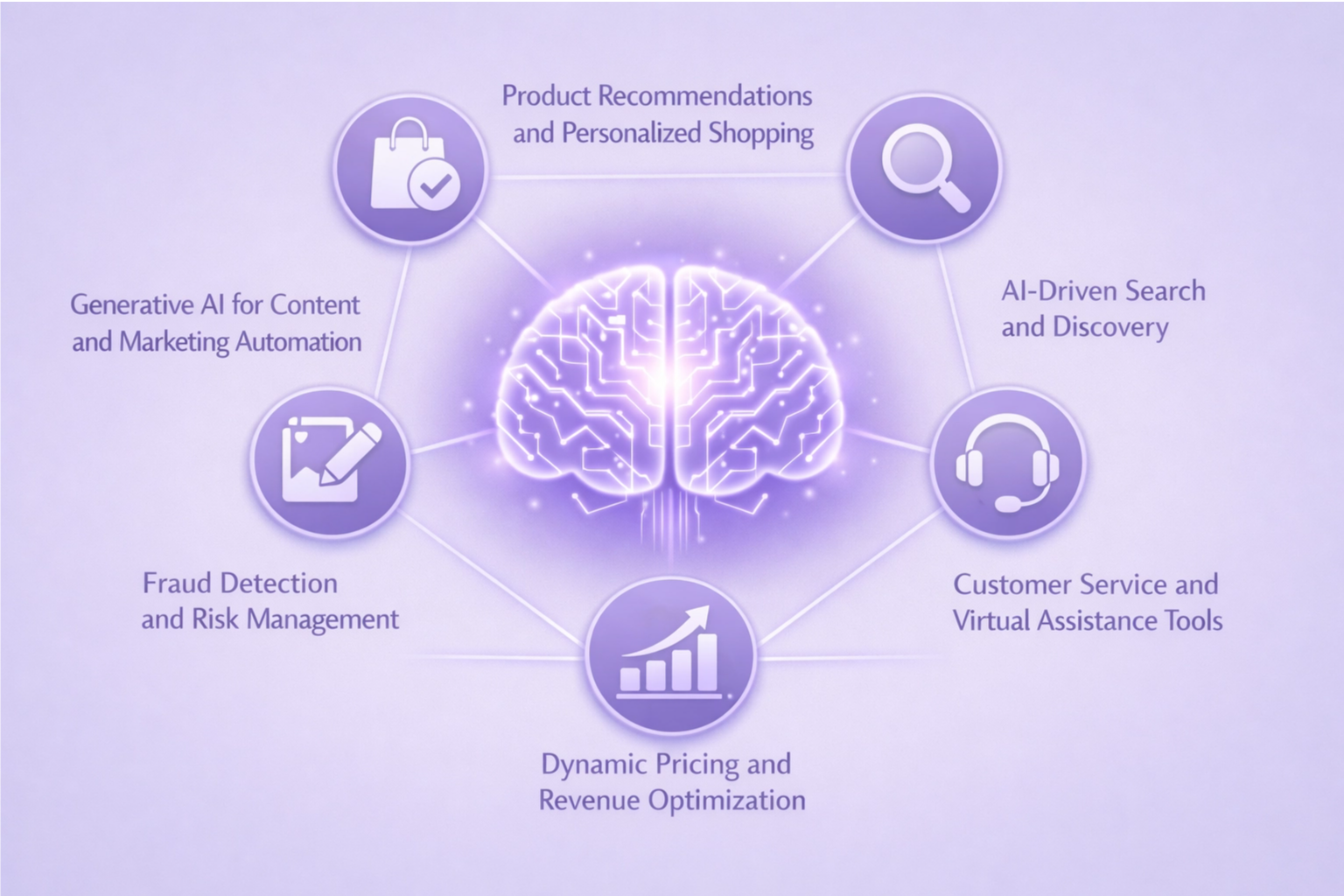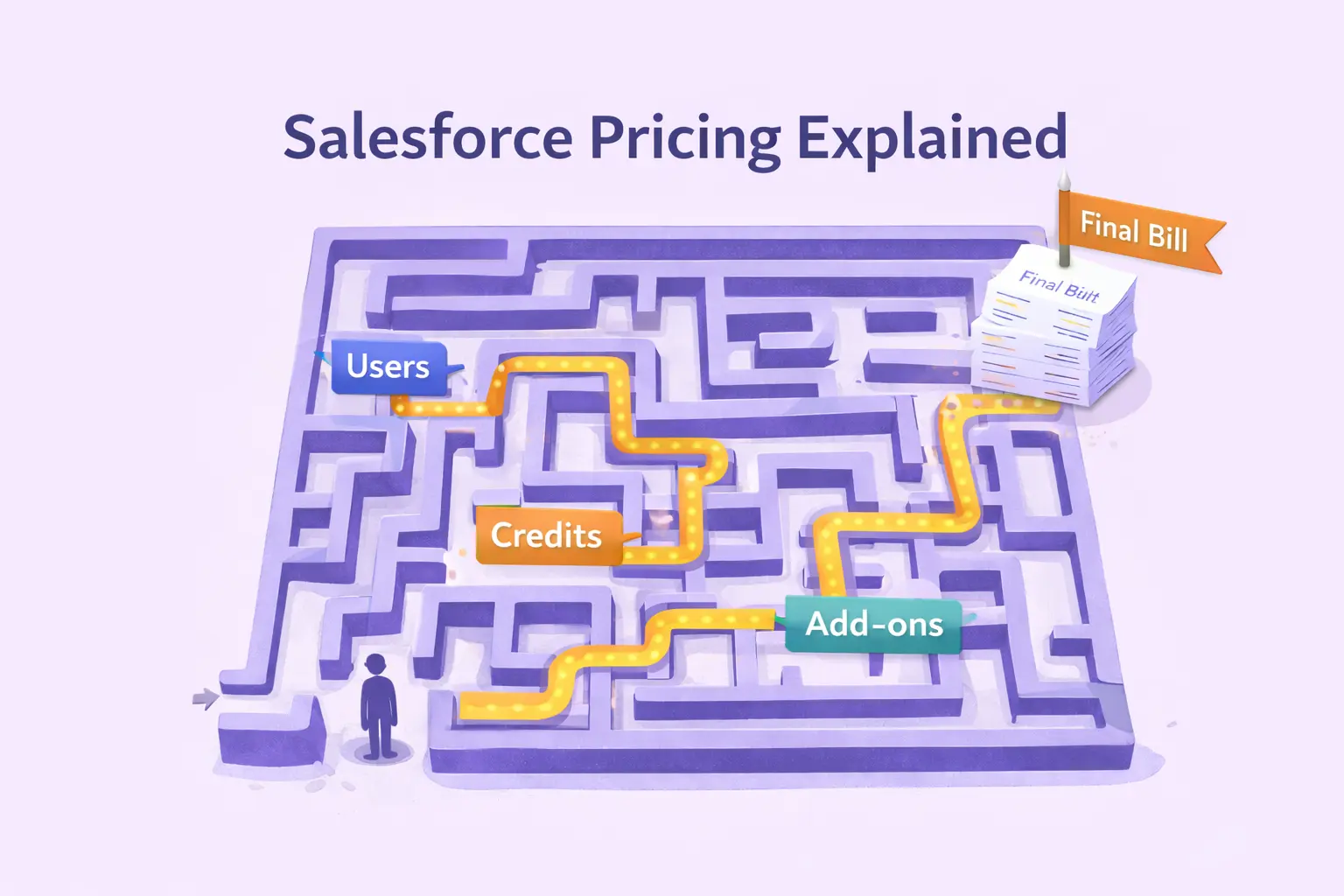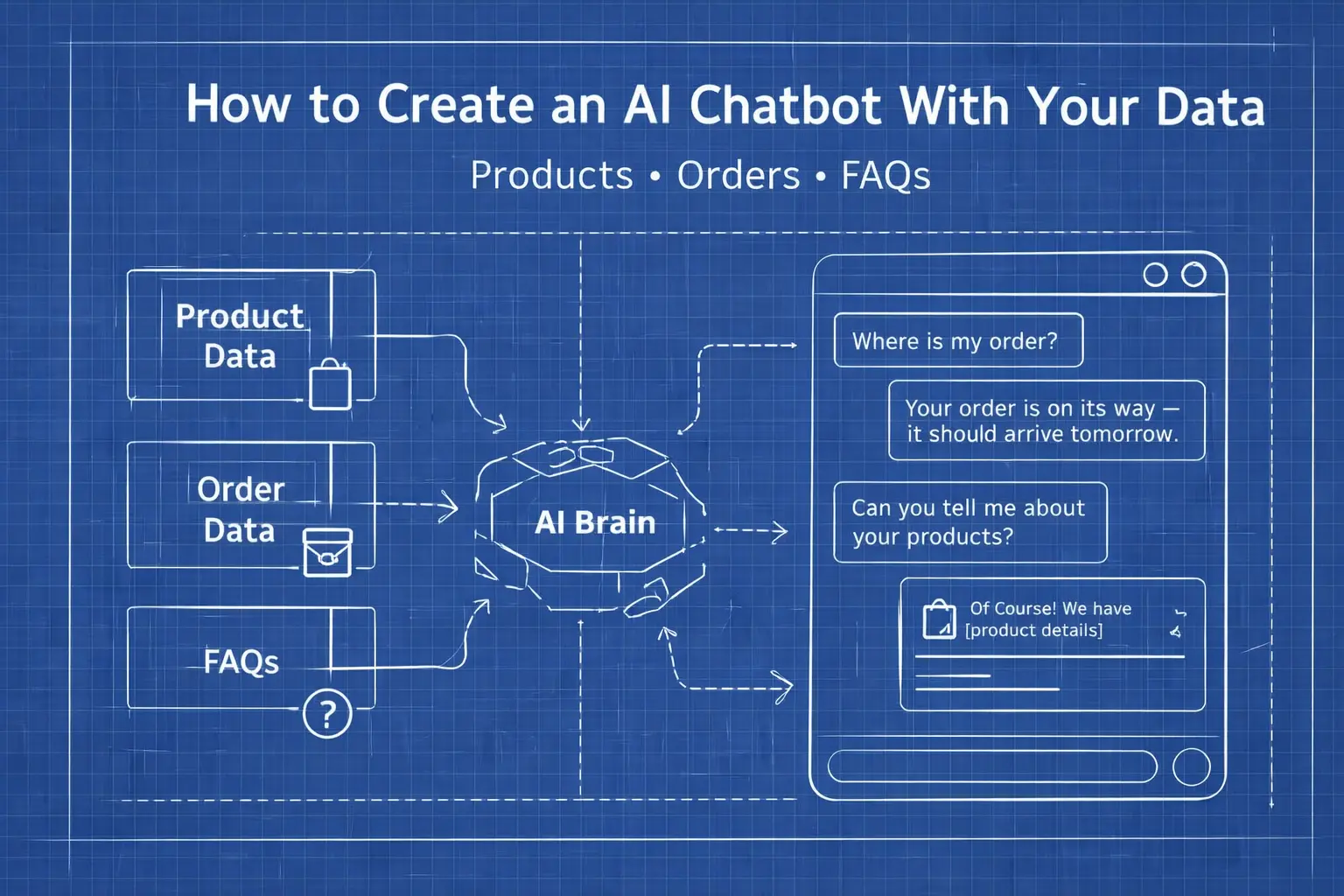Top 8 Use Cases of AI in E-commerce
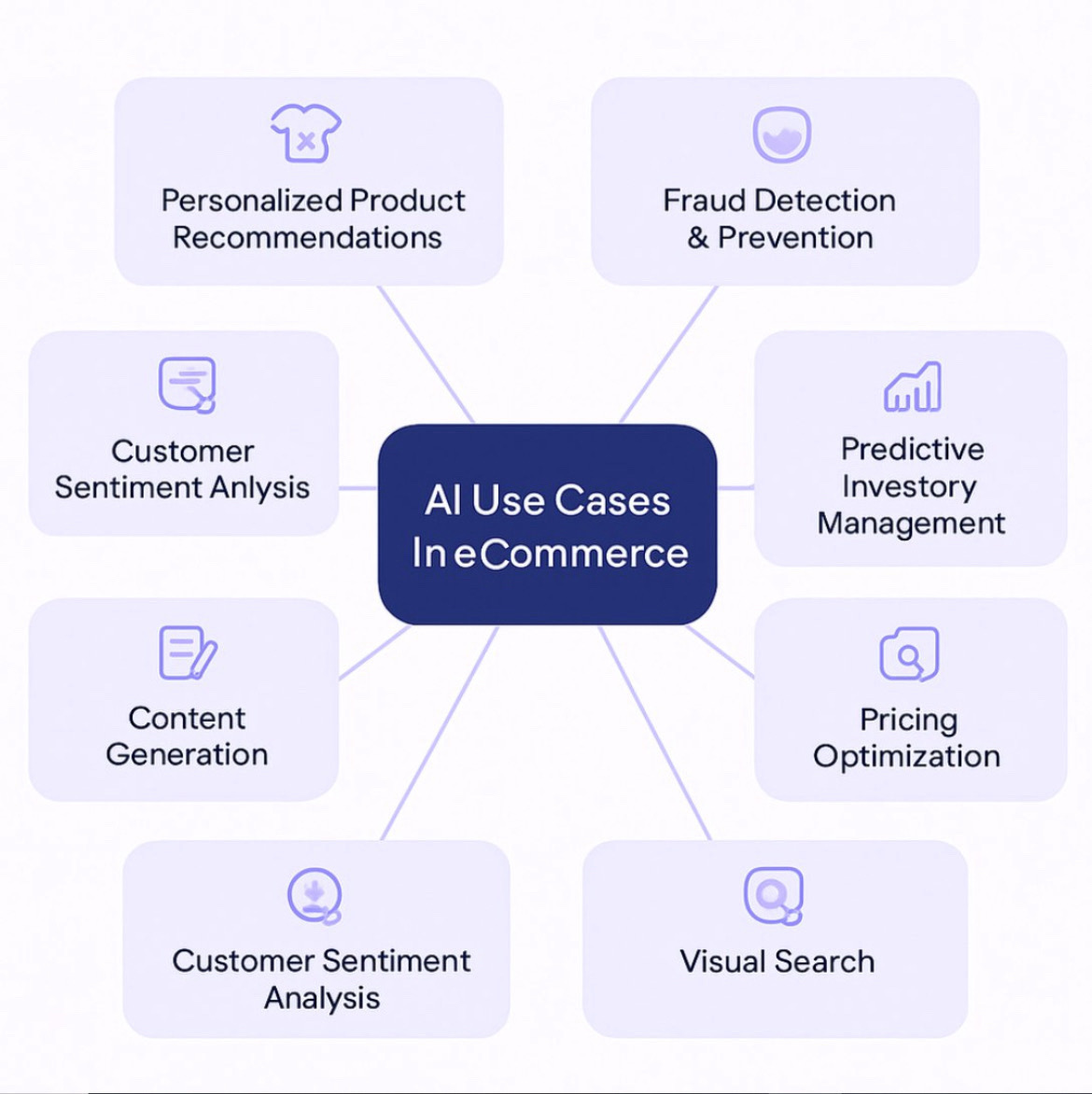
In today’s fast-moving e-commerce world, online stores never sleep, and customer needs are always changing. Artificial Intelligence (AI) is now a key part of how businesses grow and compete. It’s not just a fancy new tool; it’s changing how stores talk to customers, run their operations, and make smart decisions. With AI, companies can offer better service, work more efficiently, and grow faster.
This article looks at how AI technologies are used in e-commerce. I’ll explore the main use cases, the real benefits it brings, and how businesses have been using it. Whether you’re just starting or want to take your store to the next level, this guide will help you understand how AI can support your goals.
AI Applications in E-commerce: Key Use Cases
AI is changing the digital marketplace in many ways. These are practical and impactful solutions for businesses to enhance customer engagement and operations. Below are some of the most significant use cases of AI in e-commerce.
1. Personalized Product Recommendations
AI-powered personalized product recommendations enable e-commerce businesses to offer relevant product suggestions to individual customers. These systems analyze extensive customer data, including browsing history, past purchases, viewed items, search queries, and demographic information. By identifying patterns and correlations within this data, AI can predict products that customers will probably like.
This can enhance the customer experience by presenting item selections that feel tailored, leading to a more efficient and personalized shopping journey.
For businesses, personalized recommendations are a powerful tool for increasing average order values through upselling and cross-selling. They also facilitate product discovery, helping customers find items they might not have otherwise encountered.
Real life application: For example, you may have noticed online retailers like SHEIN utilize AI to dynamically tailor product recommendations based on real-time user behavior and interests.

2. Conversational Commerce & AI Assistants
AI-powered chatbots and virtual assistants are transforming customer support by providing instant, 24/7 assistance. These systems, often in the form of chatbots, utilize Natural Language Processing (earlier models), machine learning, and now generative AI to understand and respond to customer inquiries in a conversational manner.
They handle a wide range of tasks, including answering frequently asked questions, guiding customers through the purchase process, tracking orders, sending reminders for abandoned shopping carts, and initiating returns. The main benefits for e-commerce businesses are less work for human customer service teams, better operational efficiency, and happier customers because of quick and steady support.
Based on Deloitte, during Black Friday 2024, online retailers using AI chatbots reported a 15% increase in conversion rates.
Generative AI has advanced these capabilities, allowing for contextually relevant responses that closely mimic human interaction. This leads to higher customer engagement and conversion rates.
Real life application: 22% of Datart's requests were deflected to automated channels using Amio.
3. Fraud Detection & Prevention
Online stores lose billions every year to fraud, with estimated annual losses reaching $48 billion globally. AI helps catch suspicious behavior before damage is done, revolutionizing fraud detection and prevention through proactive systems.
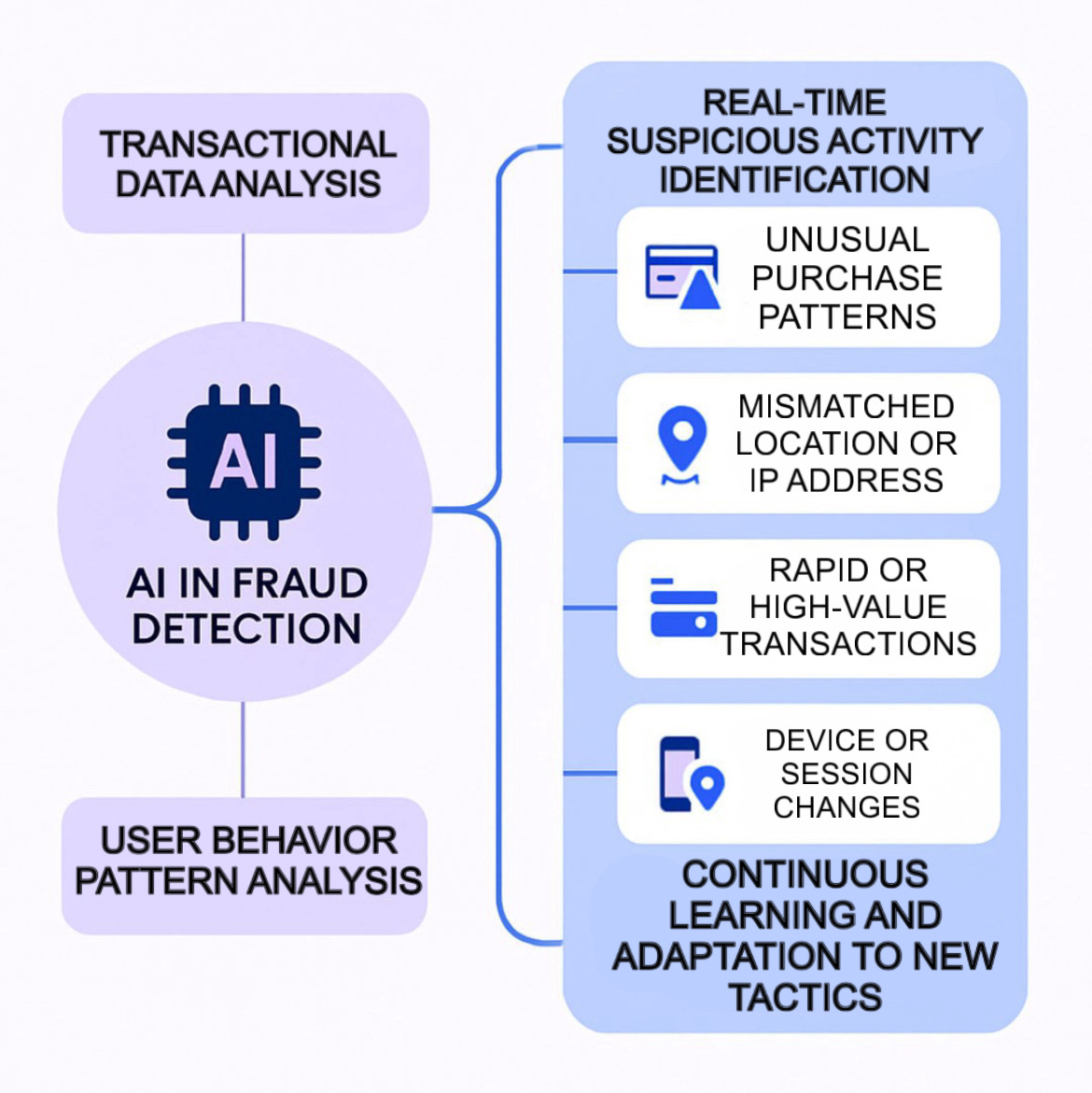
AI-powered fraud detection systems analyze vast quantities of transactional data, user behavior patterns, and other parameters in real-time. Unlike manual review, AI algorithms can process millions of data points instantly, identifying suspicious behaviors that indicate potential fraud. This includes unusual purchase patterns, mismatched shipping addresses, rapid transactions, or changes in user device or location. They get smarter over time, adapting to new scams.
Real life appliation: Companies like Visa are using artificial intelligence and machine learning such as risk scoring to counter fraud.
4. Predictive Inventory Management
Inventory management can be tricky. Order too little, and you lose sales. Order too much, and you waste money. AI looks at sales history, promotions, website traffic, and even the weather to enable precise demand forecasts. This helps with real-time inventory management, including avoiding both stock-outs and overstocking. It also reduces storage costs and helps free up cash. The freed-up capital can then be reinvested in the business.
Furthermore, AI contributes to a more efficient and resilient supply chain by optimizing logistics, transportation, and warehouse management, leading to reduced operational costs and improved delivery times.
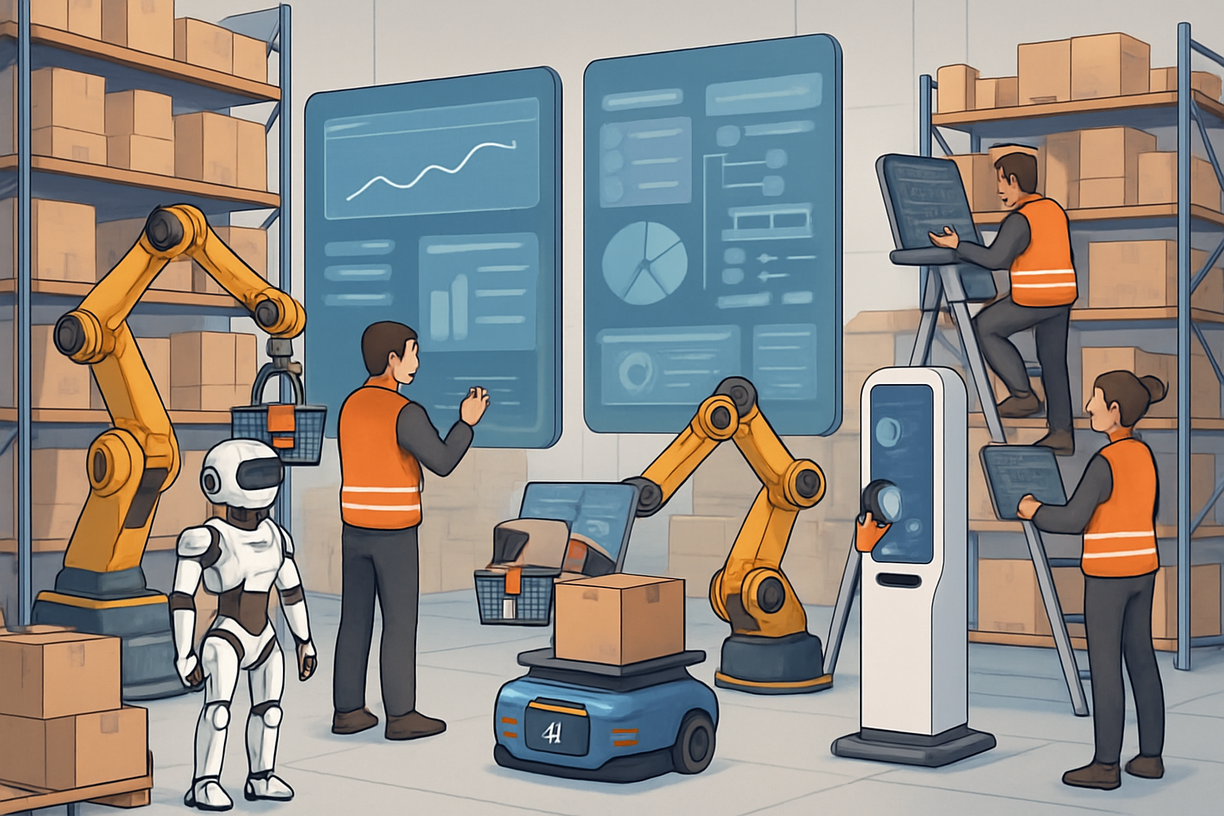
5. Pricing optimization
In the competitive e-commerce environment, pricing strategies must be responsive to market changes. AI-powered dynamic pricing enables businesses to adjust product prices in real-time, optimizing revenue and profitability. This involves continuously analyzing factors such as current sales and demand forecasting, customer behavior, competitor pricing, inventory levels, and external events like holidays or promotions.
Artificial intelligence algorithms find the best prices. These prices balance competition and profit. This allows businesses to maximize revenue by adjusting prices upwards during periods of high demand or low competitor stock, and downwards during slower periods to stimulate sales and clear inventory.
Research shows that dynamic pricing also enhances competitiveness by ensuring offerings remain attractive and responsive to market trends, preventing lost sales due to mispricing.
For instance, if a competitor experiences a stock-out of a popular item, an AI system can detect this and automatically increase your price for that item, capitalizing on the market opportunity. Conversely, if a product is underperforming, AI can recommend or implement a price reduction to boost demand.
Real life application: Amazon uses AI to adjust prices for millions of products every 10–15 minutes based on user behavior, competitor prices, and supply/demand.
6. Visual Search
Sometimes, people don’t know how to describe what they want. That’s where visual search helps. Shoppers can upload a photo or use their phone camera. The AI then analyzes the product attributes, such as colors, patterns, shapes, and textures, and matches them with similar products within an e-commerce store’s inventory.
Real life examples: Platforms like Pinterest and Google Lens are prominent examples of visual search in action, allowing users to find similar products with image recognition.
This intuitive approach removes the need for precise descriptive keywords, making product discovery more accessible and engaging. For e-commerce businesses, integrating visual search enhances the browsing experience, particularly for visually driven industries like fashion and home decor. This leads to increased product discovery, reduced friction in the shopping journey, and improved conversion rates.
Bonus: Wayfair has taken this to another level by launching "Muse". This is a visual browser where users can plug in a prompt, from generic to highly specific. The search then generates a series of inspirational photos or scenes, each of which includes a number of recommended items from Wayfair’s catalog that users can either buy right then or add to a collection for purchase later.

7. Content Generation
Content creation in e-commerce, encompassing product descriptions, marketing copy, and visual assets, can be very time-consuming. Generative AI offers a solution by automating this process. Large Language Models (LLMs) can transform raw product data into customer-friendly content efficiently. This includes writing SEO-friendly product descriptions in multiple languages, crafting persuasive advertising copy, and generating personalized emails and SMS messages for marketing campaigns.
The automation of product description writing alone can save significant time and effort for businesses with large inventories. Beyond text, generative AI can also create lifestyle or hero images for product catalogs and social media, ensuring visual consistency and brand alignment.
This all means faster listings, consistent branding, and better SEO while enhancing conversion rates.
Real life application: Ebay has integrated generative AI tools to help sellers generate high-quality listings with better titles, descriptions, and structured data - just from a photo or basic input.
8. Customer Sentiment Analysis
To grow, you need to know what your customers think. AI deep sentiment analysis scans reviews, social media, and support chats to find out how customers feel.
With Natural Language Processing, generative AI, and machine learning algorithms, AI labels feedback as positive, neutral, or negative and spot trends. This helps businesses fix problems, improve products, and fine-tune messaging, offering deeper insights into customer feedback.
This application provides valuable insights into customer satisfaction and pain points, allowing businesses to proactively address product flaws or service deficiencies. For instance, AI can quickly identify recurring negative themes from hundreds of reviews, enabling prompt action to improve customer experience and potentially boost future sales.
Benefits of AI for your E-commerce
Using AI isn’t just about keeping up with trends; it brings real, measurable benefits.
Enhanced Customer Experience: In the competitive e-commerce world, user experience is paramount. AI contributes significantly by providing personalized shopping experiences, offering 24/7 support through intelligent assistants, and enabling intuitive product discovery via visual search technology. This creates a shopping environment that feels tailored to each individual, building customer loyalty and converting casual browsers into repeat customers. When customers feel understood and efficiently guided, their satisfaction increases, leading to repeat purchases and positive referrals.
Optimized operations: AI acts as a powerful tool for streamlining operational processes. It automates routine tasks such as content creation and customer service inquiries, and optimizes complex supply chains and inventory management through predictive analytics. This drives efficiency and reduces operational costs. Demand forecasting, managing stock levels optimally, and automating various back-end processes result in leaner operations, reduced waste, and improved profitability.
A McKinsey study suggests that AI can reduce logistics costs by up to 15%.
Improved Decision-Making: Artificial intelligence transforms large volumes of data into actionable insights, serving as a reliable guide for strategic growth. Through deep learning and predictive analytics, AI uncovers hidden patterns and identifies emerging trends in customer behavior and market dynamics. This empowers businesses to make informed, data-driven decisions across all departments, including marketing, product development, and pricing strategies.
Increased Sales & Revenue: AI directly impacts the bottom line by driving increased sales and revenue. Personalized content, precisely targeted to individual preferences, leads to higher conversion rates. Dynamic pricing strategies ensure optimal revenue capture. Enhanced product discovery and intuitive shopping experiences contribute to higher average order values and lower cart abandonment. By optimizing the sales funnel and every customer touchpoint, AI contributes to robust sales growth and improved profitability.
AI integration into CRM systems leads to approximately a 15% increase in sales revenue.
Fraud Prevention: Security is critical in the digital realm, and AI protects your store by spotting suspicious behavior instantly, continuously monitoring transactions and user behavior. This proactive defense minimizes chargebacks, protects sensitive data, and maintains the integrity of online transactions, fostering a secure and trustworthy shopping environment.
Reduced Manual Labor: AI liberates human agents from repetitive, mundane tasks by automating processes such as data entry, routine customer inquiries, content development, and inventory tracking. This frees up valuable human resources to focus on higher-value activities that require creativity, critical thinking, and interpersonal skills. The result is a more engaged and productive workforce, fostering innovation and allowing businesses to allocate their personnel to areas where they can make the greatest impact.
In short, working with AI means using technology that improves efficiency, personalization, and profit. This creates a successful online shopping experience. These benefits make AI an indispensable asset for any e-commerce business aiming to thrive in the digital age.
Read more: See our top 25 e-commerce integrations for automating your shop.
Conclusion: AI as a Strategic Partner for E-commerce
AI technologies are fundamentally transforming e-commerce, offering significant advancements across various aspects of online retail. AI helps with personalized recommendations, chatbots, fraud detection, and inventory management. These uses improve customer experience and operations.
The benefits of integrating AI are clear: improved customer satisfaction, easier search and discovery, increased operational efficiency, data-driven decision-making, enhanced sales and revenue, robust fraud prevention, and the automation of manual tasks. These advantages position AI as a crucial element for sustained business growth.
But to succeed, businesses need a plan. Start by identifying your biggest needs, choosing the right tools, and focusing on data quality. Begin small, test, and improve as you go.
Read more: Top tools, tips and common mistakes in E-shop automations.
Looking ahead, AI will unlock even more. Think voice commerce, smarter virtual assistants, fully automated supply chains, and deeper personalization. Ethical AI will also become more important, making sure technology stays fair and transparent.
In today’s fast-paced market, using AI isn’t optional; it’s essential. Businesses that embrace it will lead the way, grow faster, and shape the future of online retail. And we are here to help you in your journey, even if we're not your top choice.
Book a 30-minute session where we will find out how AI bot can help you decrease call center costs, increase online conversion, and improve customer experience.
Book a demo